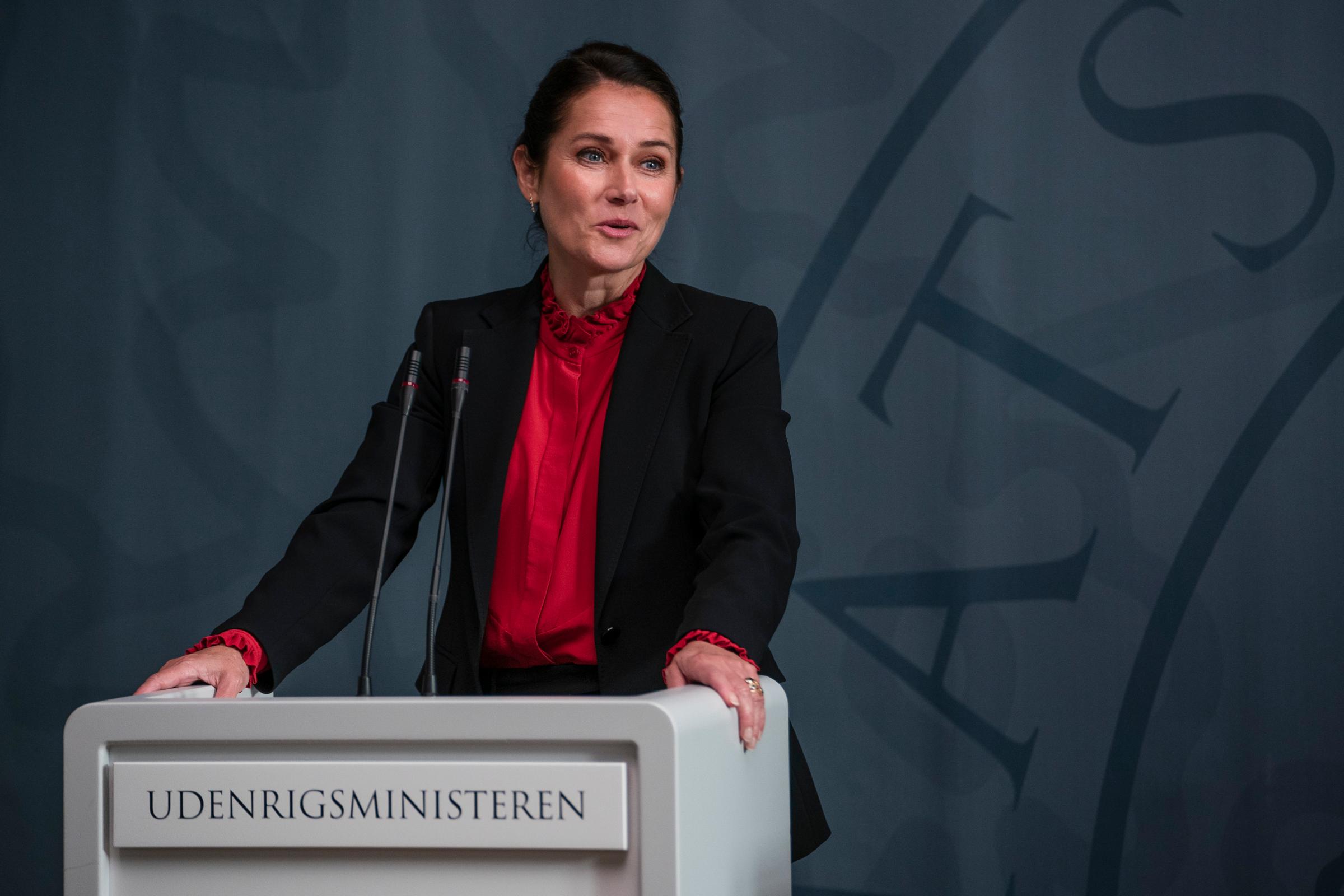Early in the new season of Borgen, the hit show about a fictional version of Denmark’s first female prime minister, Birgitte Nyborg stands in the kitchen during her son’s birthday party and washes dishes with her still hot, but now ex-, husband. It’s an intimate scene that in past seasons would have ended with Nyborg guiltily running off to address some brewing crisis; for all its political emphasis, Borgen was always, at its heart, about the double bind that women face as they attempt to balance their professional obligations with their families’ needs. And this time too Birgitte barely has time to dry the last plate before she needs to rush back to the office. But she no longer feels guilt. “I am so happy,” she confesses to her ex, “not to have to apologize for working so much.”
When its fourth season began streaming on Netflix on June 2, nearly 10 years had passed since Danish television aired what was meant to be Borgen’s finale, and in that decade, a lot has changed. Social media, climate change, populism, war: The world itself has become a darker place and the show, which has always delighted in referencing real-life events, reflects that. Much of this season’s plot revolves around the multifaceted crisis that unfolds when oil is discovered in Greenland, an autonomous region of Denmark, whose valuable natural resources —in both the show and real life—are both the object of intense geopolitical grappling among the U.S., China, and Russia, and seen domestically as a way of funding independence.
Yet the larger shift is within Birgitte and, in some ways, the show’s portrayal of accomplished women in general. No longer head of state but Denmark’s foreign minister, Nyborg is 10 years older than when we last saw her, with her kids grown, no husband to take care of, and a naked urge to hold onto power at any cost. Highly principled and idealistic in the past—a Danish version of The West Wing’s Jed Bartlett—she now abandons some values in favor of political expediency, betrays allies and even family members, and undermines anyone she perceives as threatening her power—which, in this case, happens to be a lot of other women.
Within the show’s framework, there is a logic to this transformation, and actor Sidse Babett Knudsen continues to play the character with subtlety and grace. But for viewers accustomed to seeing Birgitte Nyborg as an appealing feminist icon, the transformation may provoke a bit of cognitive dissonance. In its depiction of powerful women behaving just as badly as men, has Borgen arrived at a new, post-feminist version of true equality? Has it succumbed to an older, more misogynistic vision of women in power? Or is the show, which on many occasions has seemingly predicted real social and political change, a recognition that the reality of feminists—and women in general—lies between the poles of idealization and demonization?

When it premiered in 2010, no one expected Borgen, with its nerdy focus on the intricacies of Scandinavian coalition politics, to become a global hit. That it did so—the series was syndicated in 70 countries—is due in part to its portrayal of an idealistic politician who is good at her job. “I would get letters from people who were inspired by this woman, and who really like her,” says Knudsen. “They would write me—even American soldiers—to say that, in their current situation, it’s really nice that there’s a politician in some weird little country who is doing things well.”
But what really made Birgitte Nyborg a favorite with audiences was the person behind the politician. “Even though she was very professional, her vulnerability was there at all times,” says Adam Price, the show’s creator and co-writer. “You saw it in the first episode, in the first speech she actually gives where she says, ‘You know what? I’m wearing the completely wrong dress for this occasion. But the thing is, I’ve gotten too fat for the business suit that I should actually have been wearing.’ And everybody was just like, yes, yes, that’s what we want; we want the real stuff.”
A year after Borgen’s debut on DR, the Danish public broadcaster, Denmark elected its first female prime minister, Helle Thorning-Schmidt; currently, not only its leader, but those of Iceland, Sweden, Finland, and Estonia are all women. And while it would be a stretch to suggest that Borgen influenced the Danish vote, a show watched every Sunday by 1.5 million—that’s 1 in 4 people—may well have shaped the environment in which the election took place. “She was definitely the kind of woman that Danes would like to see as a reflection of their society,” says Susanne Eichner, professor of media studies at Denmark’s Århus University, in reference to Nyborg. “It’s a bit far-fetched to say that there was a cause-and-effect. But I will quote the Geena Davis Institute: ‘If she can see it, she can be it.’ A show like this is paramount in enabling us to see alternative realities and futures.”
In the fourth season, as in life, female leadership is no longer the novelty it once was. Although the new prime minister now tags her social media posts with #thefutureisfemale, so too is the present: the show’s Swedish prime minister, Greenlandic premier, Russian ambassador, and majority of Danish cabinet members are all women. Among them is foreign minister Nyborg, who finds herself with a boss (in the form of a prime minister with a marked resemblance—down to her tight bun and homey Instagram posts—to Denmark’s current head of state, Mette Frederiksen), who is just as determined as she is to assert her authority. The conflict between the two women is a primary tension in the show.
Women also fight it out in the newsroom, which provides another important plotline in the show. Former reporter Katrine Fønsmark has become head of news at the public network, and she quickly finds herself in conflict with a younger, more openly political colleague. “She fails to realize the importance of making sure her employees feel heard and seen,” says Birgitte Hjort Sørensen, who plays Katrine. “And she has the added pressure of a rising sh-tstorm on social media, so the room for her to maneuver becomes very narrow.”

Echoing an experience her character suffered in Season 3, Hjort Sørensen had a very Borgen moment during production when, newly returned from maternity leave, her nanny canceled on the morning of the first script read and the actor had no choice but to bring her baby to work. But in the new season, her character has handed childcare over to her hagiographically patient partner. For her part, Nyborg has resolved the double bind simply by aging out of it. Now in her 50s, Birgitte’s children have left home, leaving her to eat sad supermarket sushi alone, even while she insists on her liberation. “She is actually able to work 24/7 now,,” says Price. “Which seems like a blessing, but tastes like a curse.” That, says Price, is a central storyline this season: what happens to a woman when her roles as a wife and mother move into the background.
What is left, it seems, is power, and power, as any student of Shakespeare can tell you, corrupts. “The first time you taste it, it’s amazing, because you actually get to realize many of the idealistic dreams you had as a young politician,” says Price of his lead character’s trajectory. “But power is a slow working poison as well. And it drips into your cup of coffee every day, until, as a politician, you’re almost not able to taste that it’s coffee anymore.”
Borgen was never one of those shows that promised women they could have it all; Birgitte’s marriage collapsed because her husband grew to resent her job. And now, with the roles of wife and mother neutralized, the series finds another aspect of womanhood to maintain the public/private tension: aging and menopause. In the new season, the foreign minister struggles with hot flashes, grows irritable from lack of sleep, and sees things she doesn’t like when she looks in the mirror. Knudsen, who is 53, says she embraced the opportunity to play a realistic woman at that stage of life. “We talked about how to show that she has menopause because that’s what happens to women at a certain age and they live with it,” Knudsen says. “I thought it was just another tool in the box of showing a whole person.”
Still, many people, she says, have asked her if it was difficult to expose what they perceived as that particular vulnerability. “I have friends who have said about the age thing, ‘Oh you really see it. You really see it,’” she says with a laugh. “The interesting thing about not doing things to your face is that your face shows what’s been happening for the last 10 years.”
In Birgitte’s—and the show’s—younger days, the question of women’s suitability for power was made explicit. After Nyborg took leave from the government to care for her mentally ill daughter, a political opponent sniped, “I’m glad Birgitte Nyborg is a good mom. But do we want a good mom for Prime Minister?” The audience hardly needed to wait for Nyborg’s rousing speech before Parliament for the answer.
But this time around, the show’s reply is a little less clear. There might be an abundance of powerful women in the new Borgen, but none of them act especially admirably. Menopause—read, hormones—makes Birgitte irritable, less cool-headed, even less responsible as she abruptly leaves important meetings to deal with her changing body. Stress and her own sense of falling short lead Katrine Fønsmark to a nervous breakdown. There are whiffs of that old trope of women as too emotional or too out of control for leadership. And Birgitte’s newfound will to power, Borgen seems to be arguing, is born from a need to fill the hole that husband and children once occupied.
Is that feminism, post-feminism, or just good old-fashioned sexism? “The image of a woman who has lost her family so now she has nothing is stereotypically negative,” says media studies professor Eichner. “But there is also something progressive in that the show allows women to feel the whole spectrum, to be good and evil, broken and ambivalent.”
In the past, and especially when Birgitte was being compared to Helle Thorning-Schmidt, Knudsen would say that she thought of herself as playing the prime minister, not a female prime minister. And although she initially worried about the direction this darker Birgitte was taking, the actor relished the opportunity to emphasize the character’s more complex humanity. “When I was young, we were always talking about the roles that weren’t there for women: they were either the bitch or they were put on a pedestal. Whereas men, in their parts, could move around, they could be in between,” she says. “I think it’s really important in a feminist sort of way that we don’t pretend that women have to be perfect. It’s also interesting to show somebody who gets lost. Because that is part of the human condition.”
More Must-Reads From TIME
- The 100 Most Influential People of 2024
- The Revolution of Yulia Navalnaya
- 6 Compliments That Land Every Time
- What's the Deal With the Bitcoin Halving?
- If You're Dating Right Now , You're Brave: Column
- The AI That Could Heal a Divided Internet
- Fallout Is a Brilliant Model for the Future of Video Game Adaptations
- Want Weekly Recs on What to Watch, Read, and More? Sign Up for Worth Your Time
Contact us at letters@time.com